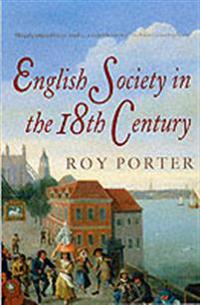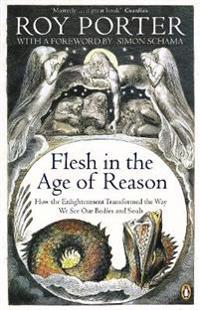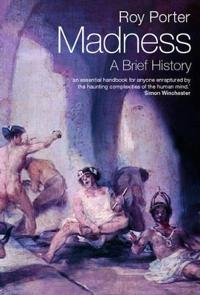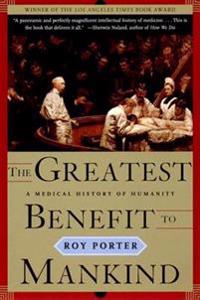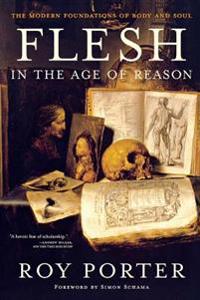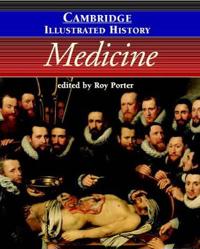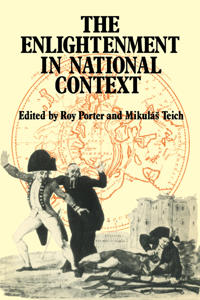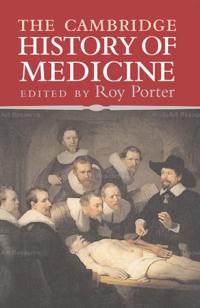The Greatest Benefit To Mankind (Pocket)
avRoy Porter
ISBN: 9780006374541 - UTGIVEN: 1999-02-01Medicine advances ever faster, and with it not just a capacity to overcome sickness, but to transform the very nature of life. Starting in ancient times, this text charts how this health revolution came about and how life for human beings in the West has ceased to be "nasty, brutish and short".[...]
London (Storpocket)
avRoy Porter
ISBN: 9780140105933 - UTGIVEN: 2000-10'Roy Porter, a historian of formidable range, turns to urban history in this marvellously lucid, informative and passionate book...Porter's facts are always at the service of the narrative, which has a finely maintained momentum, balancing statistics with the words of historians, diarists and noveli[...]
The Penguin Social History of Britain (Storpocket)
avRoy Porter
ISBN: 9780140138191 - UTGIVEN: 199004This is a portrait of 18th century England, from its princes to its paupers, from its metropolis to its smallest hamlet. The topics covered include - diet, housing, prisons, rural festivals, bordellos, plays, paintings, and work and wages.[...]
Flesh in the Age of Reason (Storpocket)
avRoy Porter
ISBN: 9780140167351 - UTGIVEN: 200501'As an introduction to early modern thinking and the impact of past ideas on present lives, this book can find few equals and no superiors. Porter is a witty, humane writer with an extraordinary vocabulary and a sparkling sense of fun. Whether he is quoting from obscure medical texts or analysing sc[...]
Enlightenment (Storpocket)
avRoy Porter
ISBN: 9780140250282 - UTGIVEN: 2001-11For generations the traditional focus for those wishing to understand the roots of the modern world has been France on the eve of the Revolution. Porter certainly acknowledges France's importance, but here makes an overwhelming case for considering Britain the true home of modernity - a country driv[...]
Blood and Guts (Storpocket)
avRoy Porter
ISBN: 9780141010649 - UTGIVEN: 2003-06Mankind's battle to stay alive is the greatest of all subjects. This brief, witty and unusual book by Britain's greatest medical historian compresses into a tiny span a lifetime spent thinking about millennia of human ingenuity in the quest to cheat death. Each chapter sums up one of these battlefie[...]
Calavera Abecedario: A Day of the Dead Alphabet Book (Häftad)
avRoy Porter
ISBN: 9780152059064 - UTGIVEN: 200609Every year Don Pedro and his family make papier-mache skeletons, or" calaveras, " for Mexico's Day of the Dead" fiesta." From the "A""ngel" and "D""octor" to the" M""ariachi" and "U""nicornio, " there's a special "calavera "for each letter of the alphabet. Come dance with them
"""Includes a glos[...]Madness (Pocket)
avRoy Porter
ISBN: 9780192802675 - UTGIVEN: 200305This work explores what we really mean by "madness", covering an enormous range of topics from witches to creative geniuses, electric shock therapy to sexual deviancy, psychoanalysis to prozac.[...]
The Enlightenment (Häftad)
avRoy Porter
ISBN: 9780333945056 - UTGIVEN: 200101The 18th-century Enlightenment was one of the most exciting and significant currents of European culture. Battling against tyranny, ignorance and superstition, it formulated the ideals which still inform our society today: a belief in reason, criticism, freedom of thought, religion and expression, t[...]
The Greatest Benefit to Mankind: A Medical History of Humanity (Häftad)
avRoy Porter
ISBN: 9780393319804 - UTGIVEN: 199910Hailed as "a remarkable achievement" (Boston Sunday Globe) and as "a triumph: simultaneously entertaining and instructive, witty and thought-provoking . . . a splendid and thoroughly engrossing book" (Los Angeles Times), Roy Porter's charting of the history of medicine affords us an opportunity as n[...]
The Creation of the Modern World (Pocket)
avRoy Porter
ISBN: 9780393322682 - UTGIVEN: 2001-11From the author of The Greatest Benefit to Mankind (winner of the Los Angeles Times Book Award) comes a "sumptuous and spicy volume" (Washington Post Book World) that highlights Britain's long-underestimated and pivotal role in disseminating the ideas and culture of the Enlightenment. In response to[...]
Flesh In The Age Of Reason (Pocket)
avRoy Porter
ISBN: 9780393326963 - UTGIVEN: 2005-08A professor of social history shares a lifetime of insights into the metaphysics of the body by retracing the emergence of a renaissance understanding of the body and the fading notion of a soul contained within it. Reprint. 15,000 first printing.[...]
The Anatomy Of Madness (Inbunden)
avWilliam F. Bynum, Roy Porter, Michael Shepherd
ISBN: 9780415323826 - UTGIVEN: 2003-09-25Originally published in 1985 by The Tavistock Press, this important set covers the history of British and continental European madness and psychiatry from the Renaissance through to Freud.[...]
The Cambridge Illustrated History of Medicine (Pocket)
avRoy Porter
ISBN: 9780521002523 - UTGIVEN: 200107Against the backdrop of an unprecedented concern for health today, The Cambridge Illustrated History of Medicine not only surveys the rise of medicine in the West from earliest times to the present day, but also glimpses into the future. It is written by a team of experts co-ordinated by one of the [...]
The Making of Geology (Häftad)
avRoy Porter
ISBN: 9780521081283 - UTGIVEN: 2008-09Between the mid-seventeenth century and the early nineteenth century there developed in Britain a range of empirical and increasingly secular sciences concerned with the earth. This book presents a detailed account of how this development led to the creation of a complex socio-intellectual fabric of[...]
Enlightenment in the National Context (Häftad)
avRoy Porter
ISBN: 9780521282123 - UTGIVEN: 198109The Enlightenment has often been written about as a sequence of disembodied 'great ideas'. The aim of this book is to put the beliefs of the Enlightenment firmly into their social context, by revealing the national soils in which they were rooted and the specific purposes for which they were used. I[...]
Dictionary of the History of Science (Häftad)
avWilliam F. Bynum, E. Janet Browne, Roy Porter
ISBN: 9780691614717 - UTGIVEN: 2014-07For readers interested in the development of major scientific concepts and the role of science in the western world, here is the first conceptually organized historical dictionary of scientific thought. The purpose of the dictionary is to illuminate this history by providing a concise, single volume[...]
The Handbook to Gothic Literature (Häftad)
avMarie Mulvey-Roberts, Roy Porter, Marie Mulvey Roberts
ISBN: 9780814756102 - UTGIVEN: 199803From Anne Rice's best-selling novels to our recurrent interest in vampires and the occult, the Gothic has an unyielding hold on our imagination. But what exactly does "Gothic" mean? How does it differ from "terror" or "horror," and where do its parameters lie? Through a wide and eclectic range of br[...]
Upplysningen (Pocket)
avRoy Porter
ISBN: 9789171730787 - UTGIVEN: 199701Upplysningen på 1700-talet är en av de mest spännande och viktiga strömmarna i europeisk kultur. I kamp mot tyranni, okunnighet och vidskepelse formulerade den ideal som än i dag bygger under vårt samhälle: en tro på förnuft, kritik, tankefrihet, religions- och yttrandefrihet, vetenskapens [...]
The Confinement of the Insane (Pocket)
avRoy (EDT) Porter, David (EDT) Wright, Roy (EDT) Porter
ISBN: 9780521283342 - UTGIVEN: 2011-06The rise of the asylum constitutes one of the most profound, and controversial, events in the history of medicine. Academics around the world have begun to direct their attention to the origins of the confinement of those deemed 'insane', exploring patient records in an attempt to understand the ris[...]
Oxford Dictionary of Scientific Quotations (Pocket)
avW. F. (EDT) Bynum, Roy (EDT) Porter, W. F. (EDT) Bynum
ISBN: 9780198614432 - UTGIVEN: 2006-09The original words announcing great scientific discoveries, from the first 'Eureka!' to the cloning of Dolly the sheep, can all be found in this fascinating addition to the world-famous 'Oxford Quotations' range. An essential reference tool, put together over 15 years with the assistance of a distin[...]
The Cambridge History of Medicine (Pocket)
avRoy (EDT) Porter
ISBN: 9780521682893 - UTGIVEN: 2006-06The Cambridge History of Medicine, first published in 2006, surveys the rise of medicine in the West from classical times to the present. Covering both the social and scientific history of medicine, this volume traces the chronology of key developments and events, while at the same time engaging wit[...]



